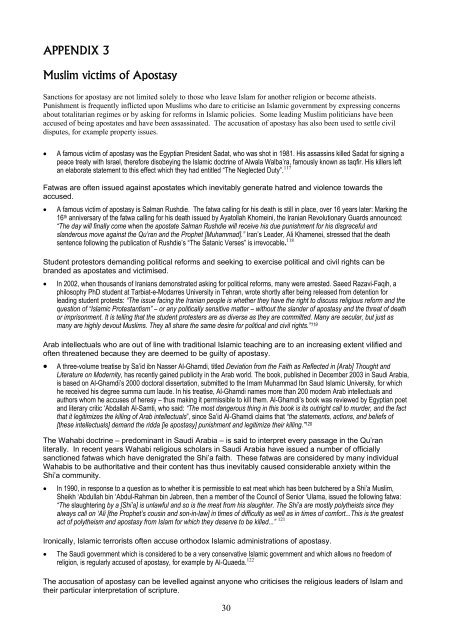Apostasy : An Overview - The Maranatha Community
Apostasy : An Overview - The Maranatha Community
Apostasy : An Overview - The Maranatha Community
You also want an ePaper? Increase the reach of your titles
YUMPU automatically turns print PDFs into web optimized ePapers that Google loves.
APPENDIX 3<br />
Muslim victims of <strong>Apostasy</strong><br />
Sanctions for apostasy are not limited solely to those who leave Islam for another religion or become atheists.<br />
Punishment is frequently inflicted upon Muslims who dare to criticise an Islamic government by expressing concerns<br />
about totalitarian regimes or by asking for reforms in Islamic policies. Some leading Muslim politicians have been<br />
accused of being apostates and have been assassinated. <strong>The</strong> accusation of apostasy has also been used to settle civil<br />
disputes, for example property issues.<br />
• A famous victim of apostasy was the Egyptian President Sadat, who was shot in 1981. His assassins killed Sadat for signing a<br />
peace treaty with Israel, therefore disobeying the Islamic doctrine of Alwala Walba’ra, famously known as taqfir. His killers left<br />
an elaborate statement to this effect which they had entitled “<strong>The</strong> Neglected Duty”. 117<br />
Fatwas are often issued against apostates which inevitably generate hatred and violence towards the<br />
accused.<br />
• A famous victim of apostasy is Salman Rushdie. <strong>The</strong> fatwa calling for his death is still in place, over 16 years later: Marking the<br />
16th anniversary of the fatwa calling for his death issued by Ayatollah Khomeini, the Iranian Revolutionary Guards announced:<br />
“<strong>The</strong> day will finally come when the apostate Salman Rushdie will receive his due punishment for his disgraceful and<br />
slanderous move against the Qu’ran and the Prophet [Muhammad].” Iran’s Leader, Ali Khamenei, stressed that the death<br />
sentence following the publication of Rushdie’s “<strong>The</strong> Satanic Verses” is irrevocable. 118<br />
Student protestors demanding political reforms and seeking to exercise political and civil rights can be<br />
branded as apostates and victimised.<br />
• In 2002, when thousands of Iranians demonstrated asking for political reforms, many were arrested. Saeed Razavi-Faqih, a<br />
philosophy PhD student at Tarbiat-e-Modarres University in Tehran, wrote shortly after being released from detention for<br />
leading student protests: “<strong>The</strong> issue facing the Iranian people is whether they have the right to discuss religious reform and the<br />
question of “Islamic Protestantism” – or any politically sensitive matter – without the slander of apostasy and the threat of death<br />
or imprisonment. It is telling that the student protesters are as diverse as they are committed. Many are secular, but just as<br />
many are highly devout Muslims. <strong>The</strong>y all share the same desire for political and civil rights.” 119<br />
Arab intellectuals who are out of line with traditional Islamic teaching are to an increasing extent vilified and<br />
often threatened because they are deemed to be guilty of apostasy.<br />
• A three-volume treatise by Sa’id ibn Nasser Al-Ghamdi, titled Deviation from the Faith as Reflected in [Arab] Thought and<br />
Literature on Modernity, has recently gained publicity in the Arab world. <strong>The</strong> book, published in December 2003 in Saudi Arabia,<br />
is based on Al-Ghamdi’s 2000 doctoral dissertation, submitted to the Imam Muhammad Ibn Saud Islamic University, for which<br />
he received his degree summa cum laude. In his treatise, Al-Ghamdi names more than 200 modern Arab intellectuals and<br />
authors whom he accuses of heresy – thus making it permissible to kill them. Al-Ghamdi’s book was reviewed by Egyptian poet<br />
and literary critic ‘Abdallah Al-Samti, who said: “<strong>The</strong> most dangerous thing in this book is its outright call to murder, and the fact<br />
that it legitimizes the killing of Arab intellectuals”, since Sa’id Al-Ghamdi claims that “the statements, actions, and beliefs of<br />
[these intellectuals] demand the ridda [ie apostasy] punishment and legitimize their killing.” 120<br />
<strong>The</strong> Wahabi doctrine – predominant in Saudi Arabia – is said to interpret every passage in the Qu’ran<br />
literally. In recent years Wahabi religious scholars in Saudi Arabia have issued a number of officially<br />
sanctioned fatwas which have denigrated the Shi’a faith. <strong>The</strong>se fatwas are considered by many individual<br />
Wahabis to be authoritative and their content has thus inevitably caused considerable anxiety within the<br />
Shi’a community.<br />
• In 1990, in response to a question as to whether it is permissible to eat meat which has been butchered by a Shi’a Muslim,<br />
Sheikh ‘Abdullah bin ‘Abdul-Rahman bin Jabreen, then a member of the Council of Senior ‘Ulama, issued the following fatwa:<br />
“<strong>The</strong> slaughtering by a [Shi’a] is unlawful and so is the meat from his slaughter. <strong>The</strong> Shi’a are mostly polytheists since they<br />
always call on ‘Ali [the Prophet’s cousin and son-in-law] in times of difficulty as well as in times of comfort...This is the greatest<br />
act of polytheism and apostasy from Islam for which they deserve to be killed...” 121<br />
Ironically, Islamic terrorists often accuse orthodox Islamic administrations of apostasy.<br />
• <strong>The</strong> Saudi government which is considered to be a very conservative Islamic government and which allows no freedom of<br />
religion, is regularly accused of apostasy, for example by Al-Quaeda. 122<br />
<strong>The</strong> accusation of apostasy can be levelled against anyone who criticises the religious leaders of Islam and<br />
their particular interpretation of scripture.<br />
30








